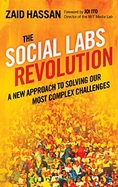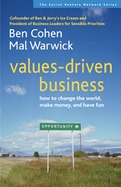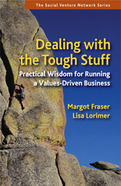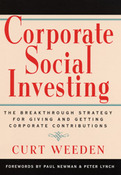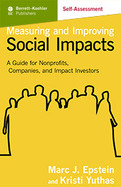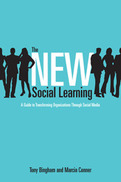People often ask, "If we can put a man on the moon, why can't we solve global hunger?"
Current responses to our most pressing societal challenges—from poverty to ethnic conflict to climate change—are not working. These problems are incredibly dynamic and complex, involving an ever-shifting array of factors, actors, and circumstances. They demand a highly fluid and adaptive approach, yet we address them by devising fixed, long-term plans. Social labs, says Zaid Hassan, are a dramatically more effective response. Social labs bring together a diverse a group of stakeholders—not to create yet another five-year plan but to develop a portfolio of prototype solutions, test those solutions in the real world, use the data to further refine them, and test them again. Hassan builds on a decade of experience—as well as drawing from cutting-edge research in complexity science, networking theory, and sociology—to explain the core principles and daily functioning of social labs, using examples of pioneering labs from around the world. He offers a new generation of problem solvers an effective, practical, and exciting new vision and guide.• The premier title in the Social Venture Network (SVN) Series--SVN is a nonprofit network of the most prominent socially conscious business leaders in North America, representing Ben & Jerry's, Working Assets, Tom's of Maine, Eileen Fisher, Clif Bar, and many others. Find out more about the series
• Combines the tried-and-tested wisdom of the co-founder of Ben & Jerry's and the chair of the Social Venture Network Advisory Board
• Concise and practical format includes a self-assessment tool, checklists, and other user-friendly features
• Listen to podcasts of Mal Warwick talking about Values-Driven Business on the Good Life radio show
• Offers personal insights and advice from of some of the most successful socially conscious entrepreneurs in the country
• Features dozens of true stories revealing what it’s really like to run a values-driven business—the good, the bad and the ugly
• Includes tested tools, techniques and coping strategies for overcoming common and not-so-common challenges
Your business plan is only going to get you so far. When you’re actually running a values-driven business problems come up that you never could have anticipated. And as a mission-driven organization you face issues your more conventional colleagues never have to grapple with. The whole experience can be incredibly isolating and draining.
Margot Fraser and Lisa Lorimer have been there, and they’re here to help. Together with five of their colleagues—including Stonyfield Yogurt founder Gary Hirshberg and former Ms. Foundation president Marie C. Wilson—they offer the kinds of personal insights and seasoned advice you just can’t get in business school. It’s like having a coaching session with some of the nation’s top socially conscious entrepreneurs.
Each chapter of Dealing with the Tough Stuff tackles a particular challenge. How open and honest can you really be with your employees and still run an efficient business? At what point do you seek outside expertise? What do you do when things go terribly wrong? When is it time to leave? The authors and the members of their “advisory board” share their experiences—not just what worked, but sometimes what spectacularly didn’t. Some of these stories are harrowing: a worker getting killed by factory equipment, a supplier embezzling funds, a false accusation of intellectual property theft. Others are simply day-to-day conundrums: meeting payroll when you’re always in debt, deciding when and how to expand in a responsible way, balancing business needs with your commitment to the triple bottom line. At the end of each chapter, Lorimer and Frasier draw on the stories to offer practical "survival suggestions" that can guide readers through similar situations.
This is a book that readers can look to for affirmation, hope and tools. Others have been through what you’re going through, if not worse. They made it and so can you—because they’re going to show you how they did it. No book can cover every challenge that might arise, but if you learn from the attitudes, techniques and coping mechanisms these seasoned leaders offer, you’ll get through the tough stuff with your sanity and your business intact.
- Details a practical, 10-step plan that can create exciting new relationships between businesses and nonprofits
- Weeden's plan could generate an additional $3 billion a year in corporate support for vital causes, improving quality of life for millions, while at the same time bolstering corporate profits
- Offers essential advice for businesses planning their corporate social investing strategies and nonprofits seeking corporate support
Offers a detailed, reliable, and proven approach to rigorously evaluating and increasing the social impact of philanthropic efforts.
Product: Online streamed self-assessment application (not downloaded), limited one-year subscription (5 tests or 12 months, whichever comes first), password controlled
Duration: The Assessment for Investors has 24 questions in seven categories. The Assessment for Operators has 24 questions in six categories. Each self-assessment takes 5-10 minutes to answer.
Results: You will receive a radar graph for both the Investor and Operator. The coauthors also offer detailed interpretation of your results from both the investor and operator perspectives. By reading your results, you can get important insights on how aligned you are with your organization, and how you can move towards better alignment. There are also opening and closing statements from the author, the ability to compare current and former results, and a print option.
BASED ON THE BOOK, MEASURING AND IMPROVING SOCIAL IMPACTS. Book summary: The world is beset with enormous problems that desperately need solutions. And as a nonprofit, NGO, foundation, impact investor, or socially responsible company, your organization is on a mission to provide those solutions.
But what exactly should you do? And how will you know whether it's working? Too many people assume that good intentions will result in meaningful actions and leave it at that. But thanks to Marc Epstein and Kristi Yuthas, social impact can now be evaluated with the same kind of precision achieved for any other organizational function.
Based on years of research and analysis of field studies from around the globe, Epstein and Yuthas offer a five-step process that will help you gain clarity about the impacts that matter most to you and will provide you with methods to measure and improve those impacts. They offer a systematic approach to deciding what resources you should invest, what problem you should address, and which activities and organizations you should support. Once you've made those decisions, they provide tools, frameworks, and metrics for defining exactly what success looks like, even for goals like reducing global warming or poverty that are extremely difficult to measure. Then they show you how to use the data you've gathered to further develop and increase your social impact.
Epstein and Yuthas personally interviewed leaders at over sixty different organizations for this book and include examples from nearly a hundred more. This is unquestionably the most complete, practical, and thoroughly researched guide to taking a rigorous, data-driven approach to expanding the good you do in the world.
PURCHASER AND USER NOTE: If you are an individual consumer newly purchasing the assessment, go directly to the shopping cart by clicking the "add to cart" icon to your left. If you are a member of an organization that has purchased a bulk order, or if you already bought the assessment in the last 12 months and are retaking it now using the original Access Key to retake the assessment please log in here. New registrants: Please enter your "Access Key" into the input field to enter the self-assessment for the first time (see bottom of page under "Please Note" for Social Impact Self-Assessment login link). A note to frequent purchasers: You cannot use your current bkconnection.com password for this product; you must create and use a new password. For any questions, please contact the support desk at 800-929-2929 (8 am-9 pm Eastern U.S. time, Monday through Friday), or [email protected]. Thank you.
-
The first book to help organizations understand and harness the extraordinary workplace learning potential of social media
-
Cowritten by the CEO of the world's largest workplace learning organization and a consultant and writer with extensive experience on the forefront of workplace learning technology
-
Features case studies showing how organizations around the world have transformed their businesses through social media
Most business books on social media have focused on using it as a marketing tool. Many employers see it as simply a workplace distraction. But social media has the potential to revolutionize workplace learning. People have always learned best from one another -- social media enables this to happen unrestricted by physical location and in extraordinarily creative ways. The New Social Learning is the most authoritative guide available to leveraging these powerful new technologies.
Tony Bingham and Marcia Conner explain why social media is the ideal solution to some of the most pressing educational challenges organizations face today, such as a widely dispersed workforce and striking differences in learning styles, particularly across generations. They definitively answer common objections to using social media as a training tool and show how to win over even the most resistant employees. Then, using examples from a wide range of organizations -- including Deloitte, IBM, TELUS, and others -- Bingham and Conner help readers sort through the dizzying array of technological options available and decide when and how to use each one to achieve key strategic goals.
Social media technologies -- everything from 140-character "microsharing" messages to media-rich online communities to complete virtual environments and more -- enable people to connect, collaborate, and innovate on levels never before dreamed of. They make learning dramatically more dynamic, stimulating, enjoyable, and effective. This greatly anticipated book helps organizations create a contemporary learning strategy that is as timely as it is transformative.


